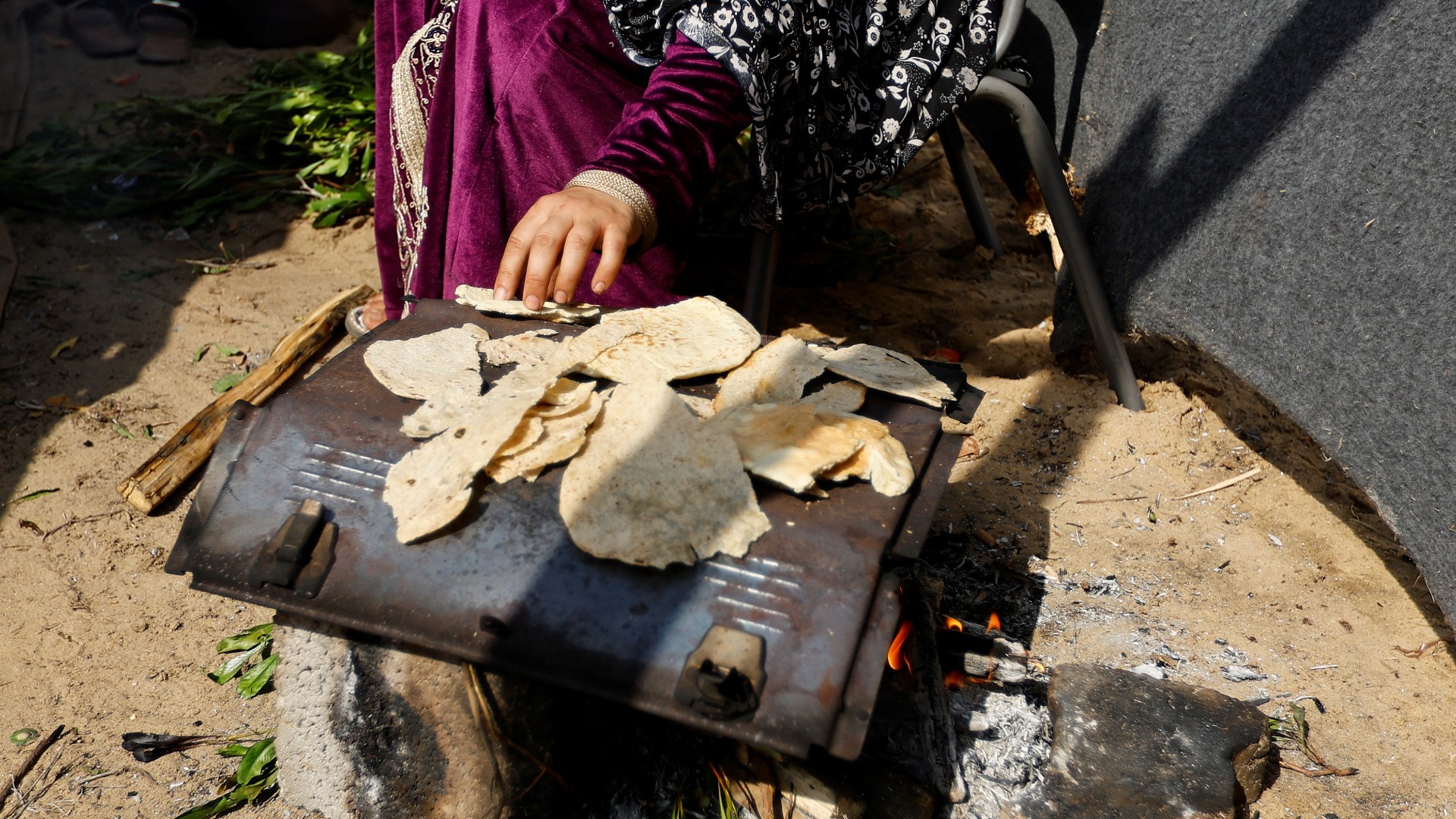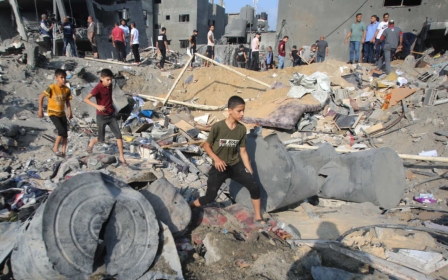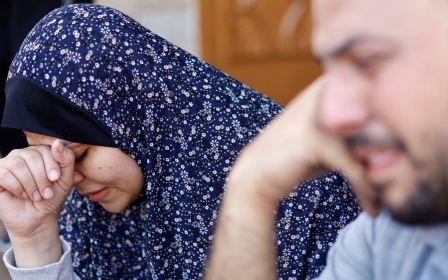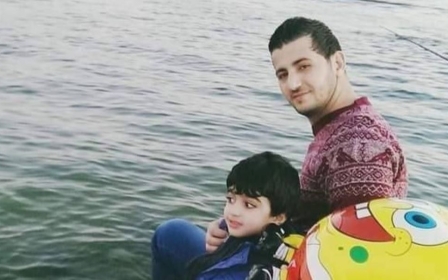Israel-Palestine war: 'If we are not bombed to death we are going to die of starvation'
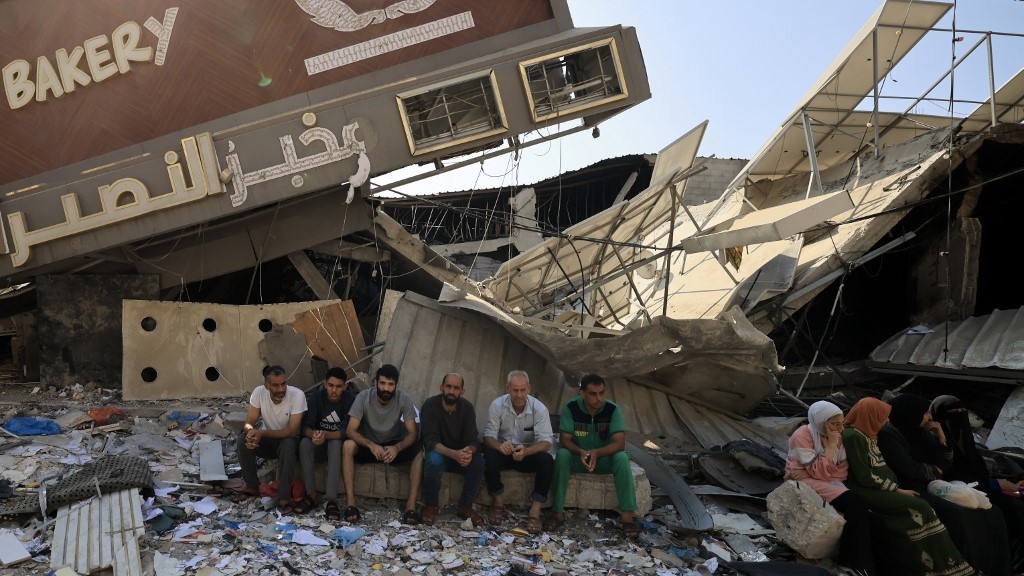
There's only one thing on everyone's mind in Gaza right now: how to secure access to food and water.
Even the never-ending bombing has become a fact of life as residents accept that there's no way of determining where the next Israeli air strike will hit.
Since 9 October, Israel has imposed a full siege on Gaza, cutting off food, water, fuel, electricity and other necessities to the besieged enclave.
After a month of relentless bombing, Palestinians have exhausted the resources they had, as generators fall quiet due to a lack of fuel and even emergency food supplies dry up.
The fear of death from air strikes has become secondary to the unavoidable necessity of eating.
“Yes, I can have a small amount of food to keep me going today, but there’s the constant worry of whether I will have food tomorrow,” one resident of the Jabalia refugee camp, who asked not to be named, told Middle East Eye.
“I went to get dates, so I could eat one in the morning, one in the afternoon and one in the evening,” he added.
Most of those in Gaza are affected by the food shortage, which has particularly impacted the elderly, sick and young children.
Follow Middle East Eye's live coverage for the latest on the Israel-Palestine war
Supermarkets have been swept clean of all products, with videos shared online showing empty shelves.
Stores and bakeries have been repeatedly bombed by Israel since the start of the war.
“Even mosques, which had water, have been bombed. Water points and solar panels are all gone due to the bombing, too," the Jabalia resident explained, adding: "If we are not bombed to death, we are going to die of starvation. This is a huge fear; I don’t need to explain how painful that would be.
“During these times of crisis we are being forced to drink any water we can find, even if it’s not clean,” he said.
'We are being forced to drink any water we can find, even if it’s not clean'
- Gaza resident, Jabalia refugee camp
The situation has become increasingly desperate.
Those able to provide essentials, such as bread, can cease to operate at any moment if Israel bombs their premises or they run out of fuel.
“There's only one bakery left, and people crowd and crowd around it in their hundreds. There isn’t even any flour left for people to try and make bread at home. It’s become like a famine here. People are living on biscuits and there’s only so long you can survive on that.”
Since the Gaza resident spoke to Middle East Eye, all bakeries in north Gaza have now closed, according to the United Nations Office for the Coordination of Humanitarian Affairs (Ocha).
Philippe Lazzarini, the commissioner general of the UN agency Unrwa, said that “hunger and despair are turning into anger” as people become frustrated by the lack of food and by living in unsanitary conditions.
'War of starvation'
According to the rights group Euro-Med Monitor, Israel is waging an "extensive war of starvation" against Gaza’s civilian population.
“Israel has deliberately focused its attacks over the past few hours on targeting electrical generators and solar energy units, on which commercial facilities and restaurants depend to maintain the minimum possible level of their work,” the group said in a statement published on Sunday.
Euro-Med Monitor added that Israeli attacks have also targeted agricultural areas east of Gaza, flour stores and fishermen's boats, leaving no sources of food.
Maha Hussaini, MEE’s correspondent in Gaza, said food shortages were an unavoidable reality on the ground.
“It’s been five days since we last found and ate bread. It’s getting harder to find food in markets. Items that completely ran out include cheese, yoghurt and mortadella,” she posted on X, formerly known as Twitter.
“A real starvation catastrophe has already started in Gaza while Israel persists on cutting off food and fuel supplies,” she added.
Palestinians in Gaza have reported feeling kidney pain due to the intense dehydration. Others have said they are mixing salt water with other things to drink.
Another resident in Gaza said: “The streets are full of rubbish, insects, flies and mosquitos, the air is polluted. My family is getting ill from the water, they have colic, they are vomiting, they have diarrhoea, congestion and kidney pain from the lack of water. It’s tragic and disastrous."
Many people have resorted to begging from others who have food to address their immediate need for nourishment.
Showering has also become a luxury, with families heading to the sea to bathe and wash their clothes - a practice that can cause skin irritation.
In schools, where thousands of people have been sheltering since the start of the war, skin diseases and conditions are rife due to the lack of clean water and overcrowding. According to Unrwa, in one site around 600 people are using one toilet.
Prior to the war, 70 percent of the Gaza Strip's children suffered from various health issues, including malnutrition, anaemia and weakened immunity, a figure which Euro-Med Monitor says has now increased to over 90 percent.
Aid has also been slow to trickle in, and has not reached the vast majority of Gaza’s population. The last month’s supply of aid entering Gaza is equivalent to what used to enter the besieged area in a single day before the war.
This article is available in French on Middle East Eye French edition.
Middle East Eye propose une couverture et une analyse indépendantes et incomparables du Moyen-Orient, de l’Afrique du Nord et d’autres régions du monde. Pour en savoir plus sur la reprise de ce contenu et les frais qui s’appliquent, veuillez remplir ce formulaire [en anglais]. Pour en savoir plus sur MEE, cliquez ici [en anglais].


